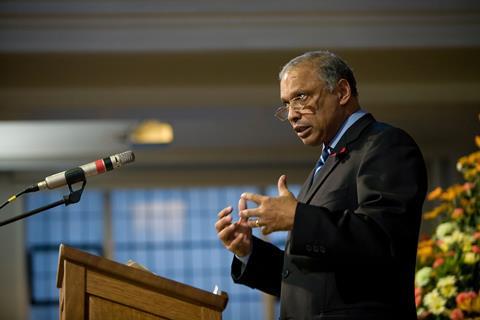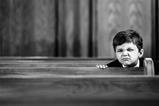After a tumultuous power struggle that led to the ousting of the charity’s founder, Patrick Sookhdeo, the Charity Commission launched an investigation and took control of how much Barnabas Aid can spend. Now, two individuals have been arrested in connection with a fraud inquiry. Tim Wyatt delves into the chaos engulfing one of the UK’s most prominent Christian charities

What is Barnabas Aid?
Barnabas Aid is a Christian charity which supports persecuted believers around the world. It was founded in 1993 by Patrick Sookhdeo and his wife Rosemary, focusing especially on Christians suffering in the Islamic world. Over the decades it became well-known among evangelical Christians in particular and raised millions of pounds in donations.
According to an account published by the previous Barnabas Aid trustees, Sookhdeo had first approached existing Christian aid agencies and missionary societies to try and raise money for believers suffering persecution in predominantly Muslim countries. When this was rebuffed, he decided to launch his own charity, originally calling it ‘Barnabas Fund’ after the so-called “son of encouragement” who helped Paul and the early apostles plant churches in the book of Acts.
Over time Barnabas Aid has grown into a family of charities, with branches operating in the UK, New Zealand, the United States and Australia, and has an annual turnover in the tens of millions of pounds. The charity provides humanitarian aid for impoverished Christians in dozens of countries around the world, supports Christian schools educating special needs children, resources local churches facing pressure from oppressive governments, and advocates for the persecuted church globally.
Who is Patrick Sookhdeo?
Sookhdeo was born in 1947 in Guyana, then a British colony in South America. His family had migrated from India generations earlier and followed Islam. When he was still a child, the family relocated to London, and a few years later Sookhdeo converted to Christianity.
He later studied theology in London, which is where he met his wife Rosemary, and became an evangelist and church planter in the 1970s. He set up an organisation to aid in cross-cultural mission in diverse London neighbourhoods, and for a time pastored a church in Plaistow, East London.
As Barnabas Aid grew, Sookhdeo began carving out a sideline as a commentator and specialist on global Islam, writing books and speaking at conferences. He claims to have acted as an advisor to the UK military and NATO, and taught at security and defence colleges.
He has often condemned the rise of Islamism, warning that the faith was growing quickly in the West and would not tolerate peaceful co-existence with the church. He was also critical of other Christian leaders who pursued interfaith collaboration with Muslims, although he has claimed to always differentiate between extremists and the peaceful mainstream.
When did controversy first begin at Barnabas Aid?
In 2014, Sookhdeo was arrested on suspicion of sexual assault as part of an investigation by Wiltshire Police. After he was later charged, Barnabas Aid suspended their founder and conducted their own investigation into the allegations, initally brought forth by a staff member at the charity. However, the internal inquiry quickly concluded there was insufficient evidence against Sookhdeo and reinstated him.
When the charges came to trial in 2015, Sookhdeo was convicted of sexual assault. He was also found guilty of two additional charges of intimidating witnesses when he tried to pressurise other Barnabas Aid staff into not offering their testimony to the police.
Shouldn’t his conviction for sexual assault meant Sookhdeo would stand down from Barnabas?
After being sentenced to a community order he did initially step down as head of the charity. But he returned to his job as director just a few months later.
The trustees at the time said they were happy with the findings of their own internal inquiry despite the criminal convictions, and continued to believe Sookhdeo was innocent. Instead, the affair was motivated by a desire to destroy Sookhdeo’s ministry and tarnish the work of Barnabas Aid, the charity said.
Weren’t there also allegations of mishandling funds?
Around this time, a series of articles by the news website Christian Today revealed an earlier power struggle within Barnabas Aid in 2012 and 2013. Trustees had grown concerned about lax financial controls and opaque spending, particularly over large transfers to a web of inter-related charities controlled by Sookhdeo and his associates.
There were also accusations of bullying and complaints about Sookhdeo’s bruising management style. After the trustees tried and failed to suspend the director, the dispute ended in the courts before it was eventually settled with a new compromise board taking over.
By the end, however, Sookhdeo had founded a new charity called Nexcus which took over much of Barnabas Aid’s activity and was run by him and his allies, effectively out-manoeuvring efforts to restrain him.
What else has he been accused of?
Later in 2015, Sookhdeo was arrested for a second time, this time on suspicion of indecent assault.
He was charged in 2016 with indecently assaulting a woman in East London in 1977, but when the case came to trial in 2018 he was acquitted.
The new trustees of the charity have continued to back him, publishing a lengthy booklet arguing he was the victim of a campaign of persecution and harassment. Barnabas Aid also criticised the woman who had made the accusations.
Sookhdeo claims he was pushed out of Barnabas Aid. Is that what happened?
In April 2024, a series of whistleblowers came to the international board of the charity to report concerns about its management and financial misconduct. As a result, the board suspended Sookhdeo and three others and asked a law firm to conduct an investigation.
Colin Bloom, the former head of the Conservative Christian Fellowship and at one time a Downing Street advisor and the Government’s advisor on faith affairs, was appointed by the board as the new international chief executive of Barnabas Aid. In that capacity he announced in August last year that the third-party investigation had found “serious and repeated contraventions of internal policies”. As well major financial impropriety, Bloom said Sookhdeo and his allies had created a “toxic work environment” where staff felt unable to challenge them or voice concerns. In a statement at the time, the charity said: “We have let our supporters down, we have let the Lord down and we have let the suffering and persecuted Church down.”
One of the four suspended individuals, the international chief executive Noel Frost, was fired after the investigation uncovered he had siphoned off more than £130,000 of Barnabas Aid funds into his own bank accounts, and bought himself flights to Las Vegas, holidays in Austria, and a laptop using the charity’s credit card. Frost was struck off as a solicitor in his native South Africa and described as a “grossly dishonest individual and a disgrace to the profession” just months before he landed his job at Barnabas Aid.
The other three suspended individuals were asked to resign, but instead launched a counterattack via the auspices of the similarly named Barnabas Aid UK charity, telling Barnabas Aid supporters that Sookhdeo had not been forced out, Bloom was not now in charge, and the investigation had not been approved by the board.
How did the Charity Commission get involved?
In October, the Charity Commission launched its own investigation into Barnabas Aid and its associated charities, which the Bloom-led organisation said it welcomed and would co-operate with. As part of the inquiry, all transactions over £4,000 had to be approved by the regulator, after it emerged Sookhdeo and his allies had regularly spent charitable funds on “items that were not consistent with our charitable objectives”, the charity said. The report pointed to concerns over potential theft of donations from Barnabas Aid supporters.
In January this year, the Commission extended its inquiry into four other charities connected to Barnabas, many of which share trustees. This was again welcomed by the now Bloom-led Barnabas Aid, but in a statement Sookhdeo said “vultures” were trying to grab money intended for the persecuted church. Barnabas supporters also received emails disputing the charity’s version of events from The Barnabas Fund Trust, a separate charity also controlled by Sookhdeo which apparently had access to an old mailing list.
What’s the latest?
Sookhdeo has continued his campaign against the Bloom-led Barnabas Aid. A website called Save Barnabas Aid – which features numerous statements from Caroline Kerslake and other Sookhdeo allies – strongly attacks Bloom, accusing him of “feathering his own nest”, incompetence, corruption, causing a collapse in donations, and of relying on the testimony of the now disgraced former CEO Frost.
In an act of solidarity with Sookhdeo, Philip Richards, the chair of trustees of Barnabas Aid UK has insisted Bloom had led a hostile takeover of Barnabas Aid and that all actions since then were illegitimate. He also implied Bloom’s actions were satanic, quoting Bible verses about “the father of lies” and the “accuser of the brethren”.
Sookhdeo and his allies have also accused Bloom of stripping Barnabas Aid of its evangelical Christian foundation, suggesting employees no longer needed to be practising Christians and that a wellbeing programme offered to staff was grounded in unchristian mindfulness techniques.
This has been dismissed by Barnabas Aid, who insisted they continue to require staff to be “Bible-believing Christians who are in good standing in their local church”. “It is regrettable that there are some people who are seemingly committed to harm the ministry of Barnabas by promulgating these falsehoods, innuendo and exaggeration,” the charity’s statement added.
What will happen next?
The two people arrested as part of the fraud investigation have been bailed pending further enquiries in what police describe as an “active investigation”. It is possible charges could be brought at any point.
Meanwhile, the Charity Commission’s investigation also remains ongoing. The Charity Commission have the ability to put further sanctions in place on the charity.
In a statement the Bloom-led Barnabas said, “This is a painful time for all of us at Barnabas, and we continue to pray that righteousness and justice will be done. Whilst the police and the Charity Commission and other statutory agencies are investigating what has happened at the Barnabas Family before April 2024, the leadership and staff of Barnabas are getting on with the important job of meeting the needs of suffering, abandoned and persecuted Christians around the world.”






































No comments yet